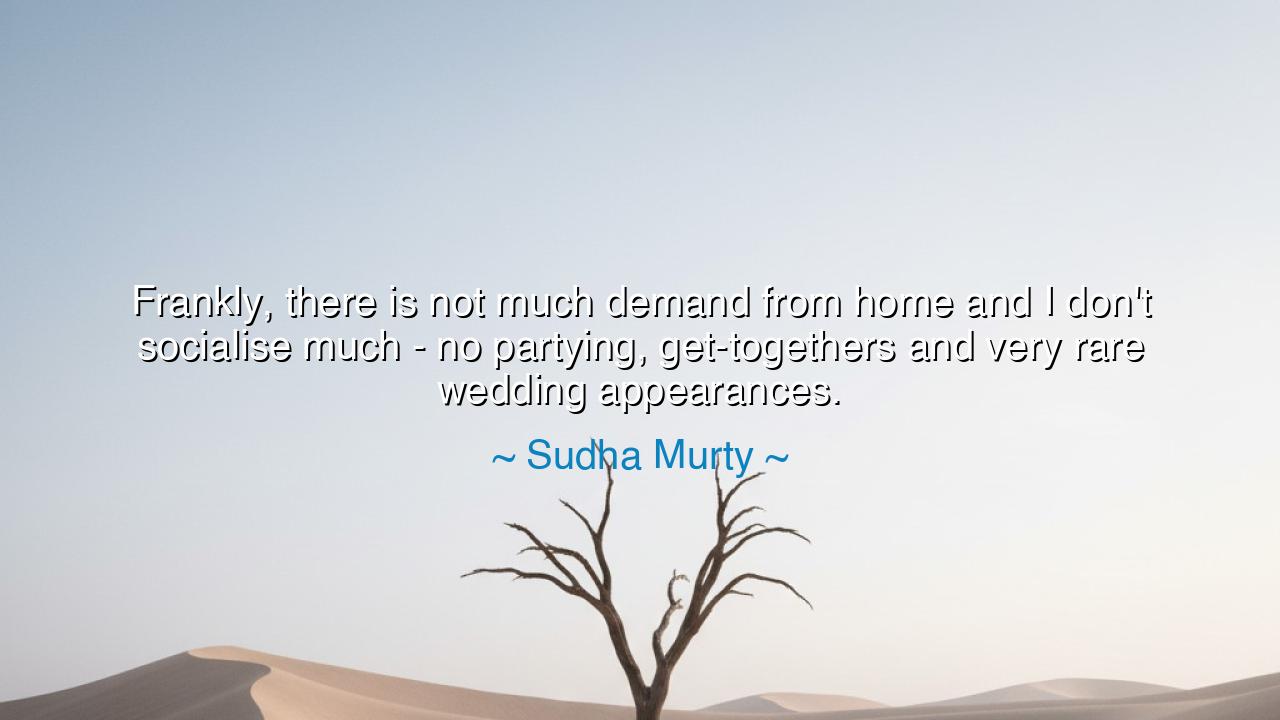
Frankly, there is not much demand from home and I don't socialise
Frankly, there is not much demand from home and I don't socialise much - no partying, get-togethers and very rare wedding appearances.






In the words of Sudha Murty, the writer, philanthropist, and woman of extraordinary humility, there echoes the calm dignity of one who has mastered the art of simplicity: “Frankly, there is not much demand from home and I don’t socialise much — no partying, get-togethers and very rare wedding appearances.” These words, spoken without pretense, reveal a philosophy both ancient and eternal — the wisdom that contentment is not found in noise, but in quiet purpose, and that a life of meaning need not be adorned by constant company or celebration. Hers is not the voice of withdrawal, but of clarity — of one who has chosen the serenity of inner strength over the restless seeking of approval.
To understand the meaning of her statement, we must look beyond the surface of her modest confession. In a world intoxicated by appearances — where success is measured by how loudly it proclaims itself — Sudha Murty reminds us that fulfillment often dwells in silence. “No partying, no get-togethers,” she says, not with disdain but with peace. These words speak of self-sufficiency, of a heart that has learned to draw joy from simplicity rather than spectacle. This is the wisdom the ancients called ataraxia — the tranquility of the soul unshaken by external noise. It is the mark of one who understands that happiness is not found in what one accumulates or displays, but in what one is.
Born into a life of service and intellect, Sudha Murty has always walked the path of humility. Despite being a pioneer — the first woman engineer at TELCO, the wife of one of India’s most celebrated entrepreneurs, and a teacher to countless through her writing — she has never sought attention. Her statement reflects the discipline of detachment, a value long revered in Indian philosophy. The Bhagavad Gita speaks of such balance: “The one who is not swayed by joy or sorrow, who finds peace in the self, is truly wise.” Murty embodies this teaching — her lack of social indulgence is not austerity, but harmony. It is the balance of a life that has found richness in simplicity.
History too gives us examples of those who understood the same truth. The philosopher Diogenes, who lived in a barrel and scorned the luxuries of Athens, once told Alexander the Great that he desired nothing except that the king “step aside and stop blocking the sunlight.” Like Murty, he sought not isolation for its own sake, but freedom from the illusions that bind the human spirit. Both reveal that self-contentment is the greatest wealth, and that those who learn to be enough for themselves carry an unshakable peace. Their solitude is not emptiness — it is fullness beyond the need for validation.
When Sudha Murty says there is “not much demand from home,” she also reveals another layer of wisdom — the beauty of detachment in relationships. Hers is a household built not on obligation, but on understanding. To have a home that makes few demands is to have cultivated mutual respect — a space where love breathes freely without the weight of constant expectation. The ancients would have seen this as a sign of maturity, for the family that honors stillness is one that has transcended dependency. Just as the great banyan tree gives shade without clinging to its roots, so too does Murty give love without entanglement.
There is also humility in her simplicity — a rejection of the glitter that so often blinds the successful. She reminds us that the greatest luxury is freedom from desire, not the satisfaction of it. “Very rare wedding appearances,” she says, for she knows that presence is not measured by attendance, but by sincerity. In an age where visibility is mistaken for worth, she teaches us that the invisible acts — the unseen kindness, the quiet discipline, the refusal to waste time on vanity — are the true pillars of a meaningful life. Hers is a quiet heroism, the kind that does not demand applause but transforms through example.
The lesson in her words is timeless: seek peace, not popularity. Do not mistake movement for progress, nor noise for joy. The wise learn early that time is sacred — it must be spent on what nourishes the soul, not what flatters the ego. To follow Sudha Murty’s example, one must cultivate stillness, devote energy to purpose, and find companionship in truth rather than crowds. Celebrate in moderation, work in dedication, and rest in gratitude.
So let her words echo like a gentle bell across generations: Live quietly, live deeply. Let your home be a place of harmony, not of demand. Let your heart be light, not laden with the world’s expectations. For when one finds peace in simplicity, one discovers a freedom that neither fortune nor fame can buy — the freedom of a life lived whole, honest, and unburdened.






AAdministratorAdministrator
Welcome, honored guests. Please leave a comment, we will respond soon